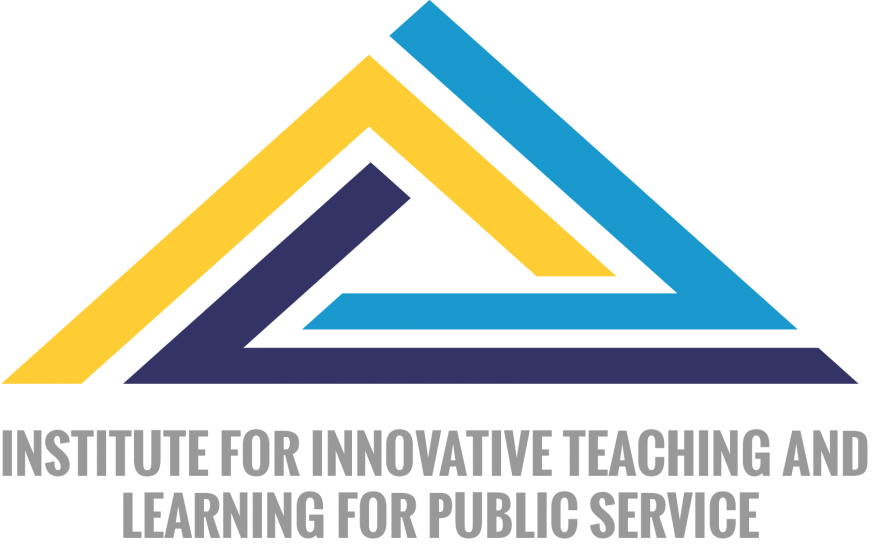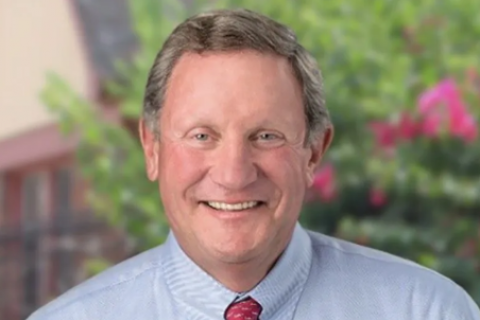
Online Resources for MPA/MPP Programs
Getting Started
NASPAA is working to develop materials faculty can immediately begin using in their shift to online coursework. Below are some initial resources.
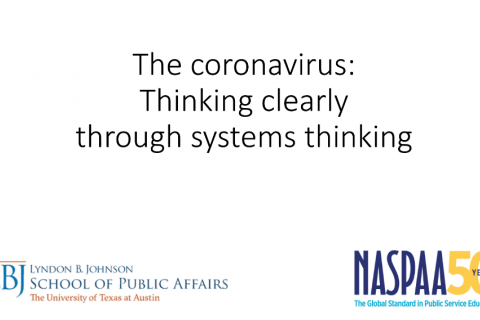
The Coronavirus: Thinking Clearly Through Systems Thinking
Don Kettl has developed a module that faculty can use right now to begin discussing the coronavirus in coursework through a systems thinking lens.
NEW Module Companion Video: Issues of Complexity Theory as They Apply to Covid-19
12 min video on the big issues of complexity theory as they apply to the virus, by Danny Buerkli. Danny is a Co-Founder of staatslabor and former Director at the Centre for Public Impact. Article referenced in video.

Imperial College Pandemic Paper
The global impact of COVID-19 has been profound, and the public health threat it represents is the most serious seen in a respiratory virus since the 1918 H1N1 influenza pandemic. Here we present the results of epidemiological modelling which has informed policymaking in the UK and other countries in recent weeks. In the absence of a COVID-19 vaccine, we assess the potential role of a number of public health measures – so-called non-pharmaceutical interventions (NPIs) – aimed at reducing contact rates in the population and thereby reducing transmission of the virus. In the results presented here, we apply a previously published microsimulation model to two countries: the UK (Great Britain specifically) and the US. We conclude that the effectiveness of any one intervention in isolation is likely to be limited, requiring multiple interventions to be combined to have a substantial impact on transmission.
Video Resources
As NASPAA develops additional videos for programs to download you can find them here. If you are interested in providing video resources for NASPAA to share with our members, please scroll down to the bottom of the page to see our Video Guidelines.
-
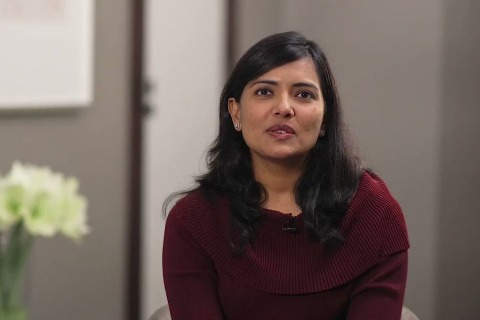
Seema Bansal and Shoikat Roy on Black Lives Matter in India
Interviewed by Don Kettl of the LBJ School of Public AffairsSeema Bansal, Head Partner & Director, Social Impact and Shoikat Roy, School Education Consultant for the Boston Consulting Group, discuss Black Lives Matter in India
-
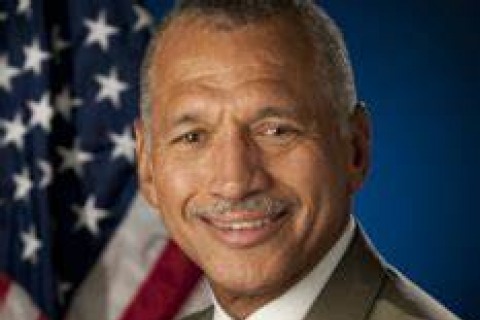
Interiew with Charles Bolden, former NASA Administrator
Interviewed by Don Kettl of the LBJ School of Public AffairsCharlie Bolden, former four-time space shuttle astronaut and former administrator of NASA speaks with Don Kettl on leading people through change.
-
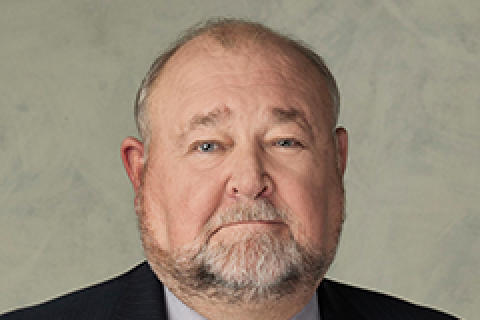
Admiral Thad Allen on the Implications for Leadership in Dealing with the Covid19 crisis
Interviewed by Don Kettl of the LBJ School of Public AffairsCoast Guard Admiral Thad Allen served as the Incident Commander of the Deepwater Horizon oil spill in the Gulf of Mexico and later replaced Michael Brown as the Federal Emergency Management Agency (FEMA) administrator in the midst of the Hurricane Katrina disaster in September of 2005. In this 12 minute interview, Allen speaks about the importance of leadership during a crisis, his role in directing the Hurricane Katrina response efforts, and his expertise in an evaluation of the COVID-19 pandemic.
Interview conducted by Don Kettl, LBJ School of Public Affairs
-
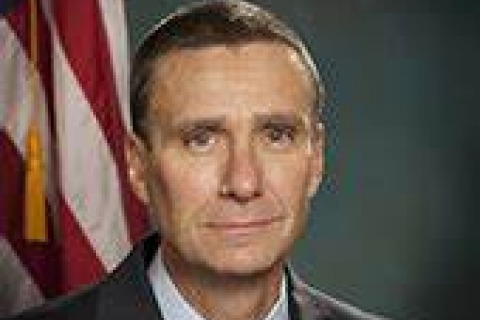
Interview of Chris Mihm, Managing Director for Strategic Issues at the US General Accountability Office (GAO)
Interviewed by Don Kettl of the LBJ School of Public AffairsIn this fifteen minute interview, Managing Director for Strategic Issues at the US General Accountability Office (GAO), Chris Mihm discusses the general roles of the GAO, important lessons learned from past stimulus acts, and projects how that knowledge will help government confront problems in administering oversight for the Coronvirus Aid, Relief, and Economic Security Act. Mihm concludes this dialogue with an interesting perspective on what the skills current policy students will need utilize governments of the future to address the needs of society. Video Memo Description
-

Issues of Complexity Theory as They Apply to Covid-19
Danny Buerkli12 min video on the big issues of complexity theory as they apply to the virus, by Danny Buerkli. Danny is a Co-Founder of staatslabor and former Director at the Centre for Public Impact. This video makes a great companion piece to the Module developed by Don Kettl of the LBJ School of Public Affairs in the section above.
Article referenced in Video
-
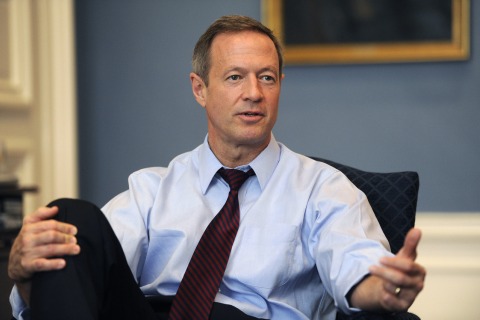
Martin O'Malley Interview: Leadership in a Crisis; Utilizing Technology & Data; & Social Innovation
Interviewed by Don Kettl of the LBJ School of Public AffairsHaving the experience as a past Mayor of Baltimore, a past presidential candidate, and the former Governor of Maryland, Martin O’Malley offers an exceptional perspective in this 13-minute interview that branches across all levels of government. Leadership in a crisis, utilizing technology and data to improve government by building trust, and the potential social progress and innovation that can occur through adversity are a few of the topics former Governor O’Malley discusses with LBJ School Professor Don Kettl. Video Description Memo
Background Reading: Smarter Government--Collaborative Leadership
-
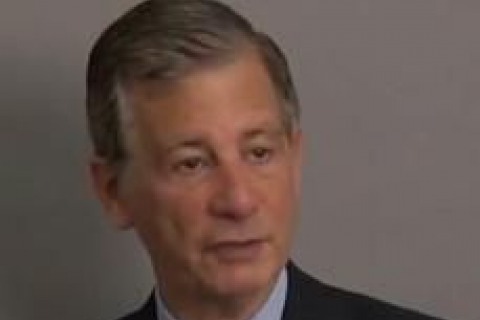
Steve Goldsmith on Local Government Innovation
Interview by Don Kettl, LBJ School of Public AffairsSteve Goldsmith serves as a current Harvard Kennedy School Professor, was previously a Deputy Mayor of New York City under Michael Bloomberg, and was also a two-term Republican Mayor of the City of Indianapolis from 1992-2000. In this eleven-minute interview, Professors Kettl and Goldsmith discuss issues, strategies, and concepts such as: effective strategies for leading cities, leveraging technology to improve government services and drive innovation, and operating across vertically integrated governments to efficiently utilize horizontal agencies to confront challenging tasks.
-

Interview with Phil Howard, founder of Common Good
Interviewed by Don Kettl of the LBJ School of Public AffairsPhilip Howard is a noted lawyer, founder of nonprofit called Common Good that organizes around nonpartisan government reform, and devout commentator on the effects of modern law and bureaucracy on human behavior and the workings of society. In this 17-minute video, Howard and Professor Don Kettl discuss problems with the current bureaucratic system of governance, some potential areas for government reform, and how this topic intersects with the current pandemic and COVID-19. Video Description Memo
Articles for further discussion:
New York Times article by Nicole Hong, that details the challenges New York City has had with overcoming bureaucratic hurdles.
Bloomberg Opinion Article by Cass R Sunstein on dealing with administrative barriers.
-
Mike Nichols, President of the Coalition for the Homeless
Interviewed by Don Kettl of the LBJ School of Public AffairsMike Nichols, the President of the Coalition for the Homeless in Houston, Texas, discusses the dynamics of leading a coalition composed of 100+ different member organizations to address homelessness. Houston is considered national leader by the Department of Housing and Urban Development (HUD) for their extensive efforts in the past decade to reduce homelessness. President Nichols discusses the development of the coalition, obstacles that have delayed potential progress, and issues on the horizon for policy makers with the growth of pandemic COVID-19.
Interview conducted by Don Kettl, LBJ School of Public Affairs Memo Description of Video
Journal Articles
Consistency is key in online learning: Evaluating student and instructor perceptions of a collaborative online-course template
Using Learning Analytics to Predict At-Risk Students in Online Graduate Public Affairs and Administration Education
When do online education technologies enhance student engagement? A case of distance education at University of Nebraska at Omaha
Curated List of Resources
-
Covid19 Articles, Reports and Other Materials
This is a regularly updated excel file of materials faculty may find useful in using to teach about Covid19 in their coursework. Compiled by LBJ School of Public Affairs Research Assistant Austin Cruz and NASPAA Staff.
-
Local Government Response Resource Bank
Reosurces compiled by What Works Cities
Content is organized in four sections: (1) Expert-recommended Guidelines & General Updates, (2) WWC Network Resources & Other Local Government Support, (3) Local Actions — organized by policy decision, and (4) Op-Eds & Commentary Specific to Local Government.
-
ARNOVA Teaching Resources
A pool of online teaching resources - from tools and tech to videos and case studies compiled by ARNOVA
Interested in Providing Resources to NASPAA?
NASPAA Video Guidelines
During this unprecedented health crisis NASPAA appreciates faculty who are willing to create and share content regarding the handling of the crisis with other programs. Given the time constraints on faculty we are not scheduling webinars but are encouraging interested faculty to develop videos that NASPAA can post to this page. This will enable programs who would be interested in using the materials developed to incorporate them into their coursework as they see fit. Below are guidelines for the development of videos for posting on NASPAA’s Website.
- Length—Please keep videos to under 20 minutes, ideally videos would be between 10-15 minutes in length.
- Quality—NASPAA prefers videos that are completed using web conferencing technology such as Zoom or join.me. However, we will accept videos done on camera phones as long as they meet the following requirements:
- The video is steady (not shaky or hard to watch)
- The audio is clear
- The video is well lit
- Attribution—Upon submission of the video, you should provide the title NASPAA should use, a short description of the contents of the video, and the names and titles of anyone included in the video
- Purpose—You should include in your submission to NASPAA: what types of courses the video would we appropriate for (general PA, Local Gov’t, Federal Gov’t, budgeting, emergency management, etc.), the level appropriate for (graduate, undergraduate, all audiences), the topic of the video, and any competencies covered.
- Intellectual Property—Faculty retain the intellectual property of the materials provided to NASPAA and are responsible for the content (it should not be libelous, partisan, etc.)
NASPAA will review all videos submitted and have final approval over what is included on our website. If NASPAA chooses not to include a video submitted, we will notify the faculty of any reasons why so they may address them and resubmit if they wish.
How to Submit—You can submit videos by emailing them directly to drudy@naspaa.org or by emailing the link to where they may be accessed (depending on file size).
We greatly appreciate faculty's willingness to develop and share materials during this time!

